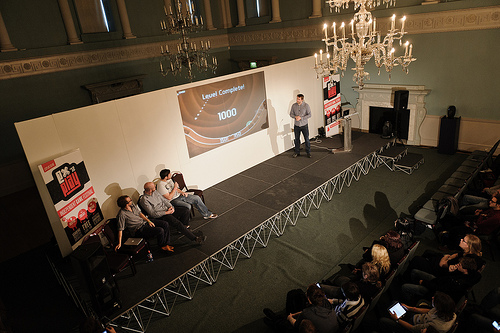Tomas was curating/sharing a panel discussion at this year's Crossover Summit as part of DocFest for the Wellcome Trust. Here is the panel information:
Exploiting the Feedback Loop
Tom Rawlings (Chair) / Jon Dovey (DCRC) / Kate Quilton (Channel 4)
Games like Bejeweled, Draw Something or Words with Friends are not one-off media events, but are on-going almost living entities. Being connected to the network they can collect huge amounts of data from players and so feed back to the designers which elements work and which do not. This allows them to respond, changing and improving the project in response. But while this ‘bio-media model’ clearly works for video games, can it work for filmmakers? By seeing video as data, a number of media thinkers are increasingly challenging the view that a film has to be a one off creation.
Plus there are some notes from the discussion online too:
The idea for the session is rooted in biological processes that happen around us (and in us!) everyday. For example, the image (right) is of 6 linked insulin molecules.
These are part of a number of biological systems we have that together make up our homeostatic systems. This is a series of monitoring and control systems that measure various facets of the body (blood sugar, temperature etc) via feedback loops and trigger the body to respond to external and internal changes. So while the body is striving to keep a form of stasis (being alive!) the chemical composition of the body is in a state of constant flux.
There are similar ideas going on in how we create, consume and develop media. This biomedia approach sees the media form itself and something in flux, connected and responding to feedback loops. It sees media artefacts themselves (games, films, novels etc) as being part of (and evolving within) a complex ecosystem, a media ecology. ...
There is more here.


